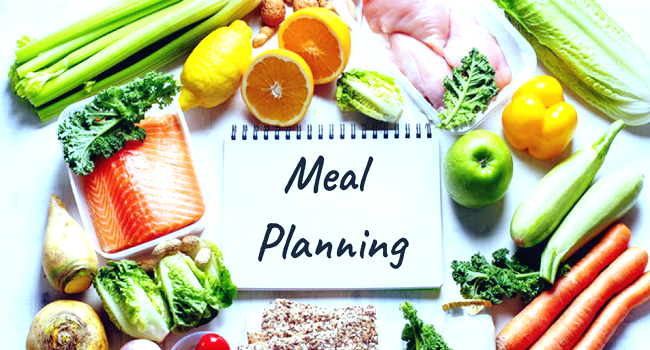
Meal planning is deciding what meals to eat in advance, usually for a week or a month, and then making a grocery list and cooking the meals accordingly.
Save time
One of the most significant benefits of meal planning is that it saves time. Instead of deciding what to cook daily, you can plan your meals in advance and cook them accordingly. It also eliminates the need to run to the store frequently, saving even more time.
Save money
Meal planning can also save you money. By planning your meals, you can buy ingredients in bulk and take advantage of sales and discounts. You can also avoid purchasing unnecessary items, such as snacks and junk food, which can add up quickly. Additionally, meal planning can help you cut food waste by using leftovers and planning meals that use similar ingredients.
Healthier diet
Planning your meals in advance gives you more control over what you eat. You can ensure a balanced diet with all the nutrients your body needs. Additionally, meal planning can help you avoid unhealthy foods, such as fast food and processed snacks, which can be high in calories, sugar, and fat.
Reduce stress
Meal planning can also help reduce stressKnowing what you will eat in advance can give you a sense of control and reduce anxiety.
Improve cooking skills
Meal planning can also improve your cooking skills. This can help you expand your culinary skills and improve your confidence in the kitchen. Additionally, meal planning can help you develop a routine and make cooking a habit, leading to more consistent and healthier eating habits.
How to Get Started with Meal Planning
Set a goal
This could be to save time, save money, or eat a healthier diet. Once you have a goal in mind, staying motivated and sticking to your meal plan will be easier.
Choose your recipes
You can also experiment with different cuisines and flavors to keep things interesting.
Make a grocery list
After you have chosen your recipes:
- Make a grocery list.
- Include all the ingredients needed for your meals and snacks or other items.
Shop and prep
Once you have your grocery list, go shopping.This could include chopping vegetables, marinating meat, or cooking rice. Doing some prep work in advance can save time later in the week when you are busy.
Plan your meals
Once you have your ingredients prepped, it’s time to plan your meals. Decide which meals you will eat on which days, and ensure you have everything you need for each meal. This can help you avoid last-minute store trips and ensure you have enough food for the week.
Cook and store
Once your meals are cooked, portion them into containers and store them in the fridge or freezer.Planning your meals in advance can reduce stress, improve your cooking skills, and develop healthier eating habits. To start with meal planning, set a goal, choose your recipes, make a grocery list, shop, prep, plan your meals, and cook and store your meals properly.
Some More Tips
Start small
If you are new to meal planning, starting small is a good idea. Plan just a few meals for the week and gradually increase the number of meals as you become more comfortable with the process.
Keep it simple
Meal planning doesn’t have to be complicated. Stick to simple recipes that use a few essential ingredients and can be prepared quickly and easily.
Get the family involved.
Get your family involved in meal planning. Ask them for input on what meals they would like to eat and let them help with the shopping and meal prep.
Stay flexible
Feel free to make changes to your meal plan if needed. If you have unexpected events or need to eat what you had planned, switch things up and make something else. In conclusion, meal planning can benefit your health, budget, and time management.Start small, keep it simple, and get the family involved to make meal planning a fun and rewarding experience for everyone.
Benefits of Meal Planning
Saves Time
One of the most significant benefits of meal planning is that it saves time.
Saves Money
You can also buy ingredients in bulk or when they are on sale and use them for multiple meals. Additionally, you can reduce food waste by planning meals that use up leftovers and using up ingredients before they go bad.
Promotes Healthy Eating
You can also prepare meals with lower calories, fat, and sugar and higher in fiber, protein, and other essential nutrients.
Reduces Stress
Meal planning can also help reduce stress. When you know what you will eat for each meal, you don’t have to worry about making last-minute decisions or rushing to the store to buy ingredients. You can also plan meals that are easy to prepare on busy days and have them ready when needed. This can reduce mealtime stress and make it a more enjoyable experience.
Improves Cooking Skills
Meal planning can also help you improve your cooking skills.This can help you become a better cook and make mealtime a more enjoyable experience. Getting started with meal planning may seem daunting at first, but it’s a simple and rewarding process that can help you take control of your diet and improve your health. By setting goals, choosing recipes, making a grocery list, shopping and prepping, planning your meals, and cooking and storing your meals correctly, you can enjoy the benefits of meal planning and make healthy, home-cooked meals a regular part your routine.
